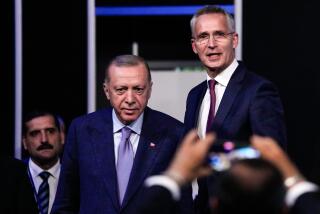U.S. Recalls Envoy to Bulgaria to Protest Oppression of Turks
- Share via
WASHINGTON — The Bush Administration recalled its ambassador to Bulgaria, Sol Polansky, on Tuesday to protest the Sofia regime’s continuing oppression of the country’s ethnic Turkish minority, which has caused about 310,000 people to flee to Turkey in the past three months.
State Department spokesman Richard Boucher said Polansky was ordered to return to Washington “for consultations.” On the traditional list of diplomatic gestures, the action is less severe than a formal breach in relations.
“The ongoing abuse of human rights of Bulgarian ethnic Turks by the government of Bulgaria remains an issue of serious concern to the United States government,” Boucher said. “The United States has made its views on this matter known to the government of Bulgaria, both publicly and privately, and President Bush has spoken several times to Turkish leaders to express our strong support for their efforts to end this tragic situation.”
Boucher said the United States is exploring the possibility of providing economic aid to help Turkey cope with the influx of refugees.
Bulgaria began five years ago to force its 1-million-person Turkish ethnic minority, most of them members of families that have been in Bulgaria for generations, to assimilate or leave. At first, Turks were ordered to adopt Slavic names and were prohibited from speaking Turkish in public.
In mid-May, the Communist government intensified the crackdown, prompting almost one-third of the Turkish community to cross the border into Turkey. Some of the refugees say they were expelled, while others say they left voluntarily to escape persecution.
Turkey announced last week that it plans to close its border with Bulgaria in an attempt to stem the flow of refugees. But Boucher said Tuesday that the United States understands that the crossing points remain open.
“Turkey has tried to make this a more orderly process, and the Bulgarians have so far not taken them up on the offer,” Boucher said.
The Turkey-Bulgaria dispute, which goes back more than a century, is primarily ethnic and religious. However, in the modern world it takes on a strategic and political coloration because Bulgaria is a member of the Soviet-led Warsaw Pact while Turkey is a member of the North Atlantic Treaty Organization. NATO recently issued a statement condemning the Bulgarian policy.
Unlike Hungary and Poland, Bulgaria has done nothing to relax the grip of the Communist Party on its government.
More to Read
Sign up for Essential California
The most important California stories and recommendations in your inbox every morning.
You may occasionally receive promotional content from the Los Angeles Times.













